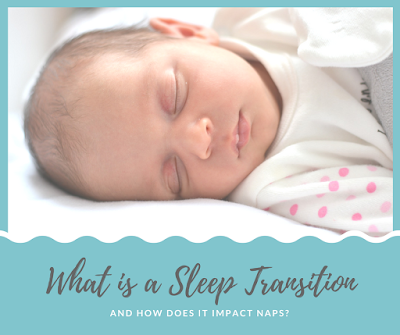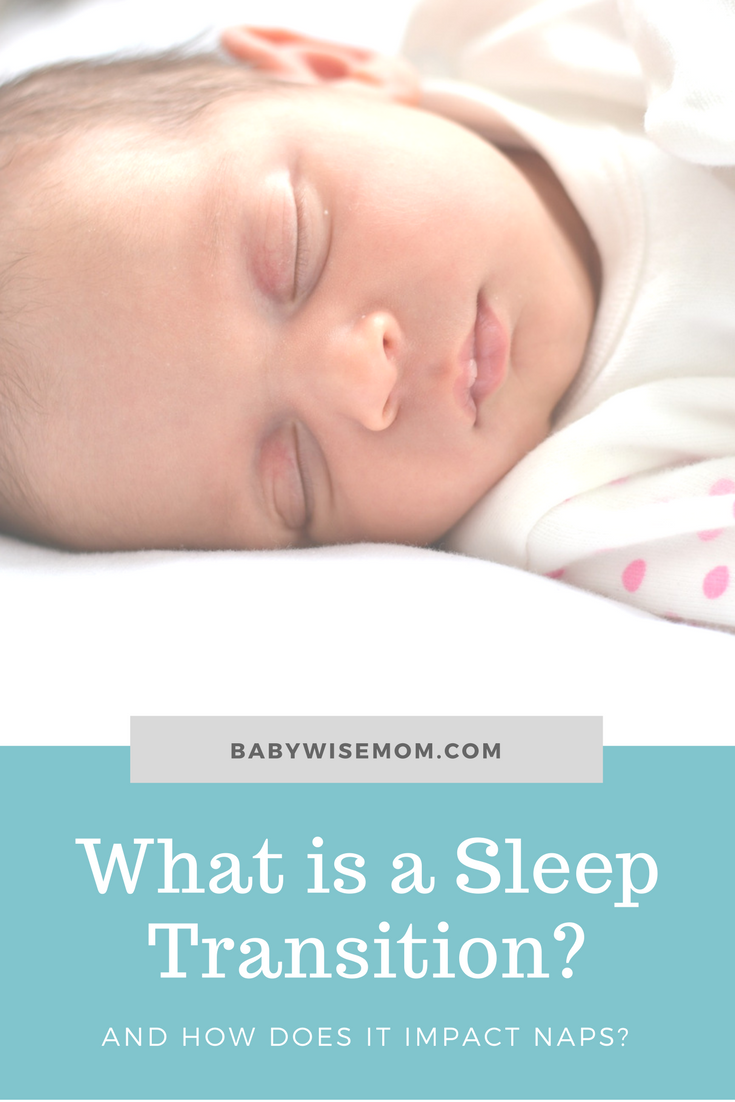A sleep transition has a huge impact on naps and can explain why your baby is not sleeping longer than a 45 minute nap. Learn all about it here.

When Brayden, my oldest child, was first born, I would rock him to sleep. He fought that rocking with as much effort as a mother bear would put into protecting her little cub. He cried and he thrashed, but I eventually got him to fall asleep. It took so much time and effort to get him to sleep that I would hold him for a long time before finally trying to lay him in his bed to sleep. I did not want him waking up without a real nap!
Pretty much as soon as I would put him in his bed, however, he would wake up! I could not understand why! We were both tired and exhausted.
Today, I know why. It was because I was holding him so long that I was putting him down right at his sleep transition.
A sleep transition is when the body moves from one type of sleep to another. Did you know that the body has different types of sleep? You have probably heard of REM sleep. REM is a lighter sleep when we are dreaming. We also have deep sleep, or non-REM. The time the body slips between the two types of sleep is our sleep transition.
The sleep transition is the moment that we can all be woken up most easily. That means if you are moving your baby from your arms to the bed right at the transition, your baby is more likely to fully wake up instead of slipping into a deeper state of sleep. The same is true for a dog barking, sister yelling, or the doorbell ringing right at the sleep transition. This post may contain affiliate links which won’t change your price but will share some commission.
These sleep transitions happen about every 45 minutes (as explained in The Baby Whisperer Solves All Your Problems -aff- on page 172). Karp in The Happiest Baby on the Block says they happen every 60 minutes (page 219).
I find 45 minutes to be more accurate for most babies.
That explains why much of the time, short naps are 45 minutes long. As soon as your baby falls asleep, you have approximately 45 minutes until the transition happens. If your baby passes that transition and stays asleep, then your baby will sleep another 45 minutes, at least.
Tracy Hogg also talks about it on page 186 in Secrets of the Baby Whisperer.
A baby’s sleep cycle is 45 minutes long. Babies start with deep sleep then move into REM, then wake up. Your baby might make noises at transition time, but if left alone will sleep through the transition.
REM sleep and deep sleep do different things for your body. “…high amounts of REM sleep, under the influence of low melatonin levels, help direct the course of brain maturation early in life” (Healthy Sleep Habits, Happy Child -aff- pages 28-29). “…REM sleep is especially important for restoring us emotionally or psychologically, while deep, non-REM sleep appears to be more important for physical restoration” (Healthy Sleep Habits, Happy Child -aff- page 29).
That means our children need longer than a 45 minute nap to get both benefits of sleep.
TIME OUT! For any of you with a chronic short napper who is no freaking out more than you already were, please take heart. Brayden took 45 minute naps until he was 6 months old. Today he is a very smart (gifted) 11 year old. So don’t think your child is doomed if he/she is taking short naps. So relax. Continually strive to get longer naps, as I did, but do not let short naps ruin your day.
Now you know that a transition happens at 45 minutes and what the body is doing when it transitions. Your baby will most likely shift at this transition point. Some babies even cry out (they will keep their eyes closed and appear fully asleep other than crying out). Some will wiggle around quite a bit. If left alone at this transition, and not woken up by some loud noise or other factor, your baby will go back to sleep.

The sleep transition is why a sound machine can be so helpful if you have older children and/or live in a noisy area. The sleep transition is also a big reason why swaddling is helpful in early months. When your little one is transitioning, rather than startling himself right into awakeness, he can squirm a bit and then go back to sleep.
>>>Read: When Baby Wakes Early From Nap, Wait 10 Minutes
The sleep transition is why sleep props are a bad idea. If your baby relies on a certain prop to fall asleep and is unable to fall asleep on his/her own, when the transition comes, your baby will wake up rather than slip into the next sleep cycle.
This is why if your baby is waking after 45 minutes, you need to figure out what is it that is causing your baby to come fully awake rather than slipping into the next sleep cycle. Is there hunger? Is there pain bringing your baby to full alertness? Is there some noise? Is your baby too hot or cold to comfortably sleep?
Here are some things Karp recommends to help baby sleep better (these are his 5 S’s):
- Swaddle
- White noise
- Swing
When Brayden was a baby, we learned that 45 minutes after he fell asleep, we needed to be quiet. We knew if he made it past that 45 minute hump, he would take a good nap. With Kaitlyn, we didn’t need to worry about it. She loved to sleep. Brayden, however, did not and was also so curious. Hearing new sounds (or familiar ones) would get him up and wanting in on the action.
This sleep cycle pattern is the reason I list so many of the things I do in nap problems or 45 minute intruder problems. As the baby is shifting cycles, if he is too hot or cold, he will likely wake up. If a dog is barking, he will likely wake up. If he smells something of interest, he might wake up (I have a friend whose son was very sensitive to cooking smells). If he doesn’t know how to soothe himself and depends on your or some other device, he will likely wake up. If he is hungry, he will wake up. If he is practicing a new skill, he will likely remember that when he wakes up and want to continue work on it.
Understanding what a sleep transition is can help you help your baby get better sleep. I may not have realized what was going on when my oldest was a little one, but now you know! Here is to better sleep.
Related Posts:
- Newborn Sleep Patterns
- Healthy Sleep Elements and Developments
- My Sleep Hierarchy For Newborns
- When Sleep Props Are Okay (And When to Avoid Them)
- Sleep Deficit
Reader Comments:
- Jaclyn said…
Oh, wow. I’m glad to know my baby’s not the only one! She’s so sensitive at that 45 minute point. I have to be completely quiet, and make sure nothing else makes a sound in our house.(Sadly, can’t control what goes on outside of our house.) She’s always been this way! Thanks for your sharing your wisdom and experiences. For a first time mom, it’s a HUGE blessing! Jaci
September 26, 2008 9:34 PM
Plowmanators said…
You are welcome Jaclyn! Something you might consider since she is so sensitive is some sort of white noise. There are machines or you could do a humidifier..just something to drown out other stuff a little.
September 29, 2008 11:28 AM
Reader Questions:
- Laura said…
I am so glad I found your blog! It is exactly what I needed. My baby boy is 5 weeks old and seems to be waking up throughout his naps. I don’t know how much to let him cry and when I should be going in to help him…what if it’s a gas problem or he’s cold? He was a good napper but our life has been busier the last week or two so I’m wondering if that’s messing him up. Anyway, thank you for your blog. It is no doubt a huge time sacrifice for you but I really appreciate it.
September 27, 2008 11:26 AM
Plowmanators said…
Laura, At 5 weeks, I don’t know that I would let him cry in the middle of a nap yet (unless you find it works). See this post for ideas: Waking Early From Naps/Won’t Fall Asleep For Naps
September 29, 2008 11:29 AM - Annie Haymans said…
I just found your blog and I am so excited. Congrats on you new news, that is so exciting. I am a first time mom I have a 6 month old baby boy. I started babywise at about 2 weeks old and he has done perfect until about the past month. He started waking up to nurse in the middle of the night again….he would cry four more than an hour and I would finally go nurse him. So when that started, I decided to introduce solid foods thinking the reason he was waking was due to hunger. That helped for a while and now he has started waking up again. I have had a really hard time with him for the past month. Any advice…please help.
September 29, 2008 4:35 AM
Plowmanators said…
Annie, see this post:5-8 Month Sleep Disruptions
September 29, 2008 11:30 AM
